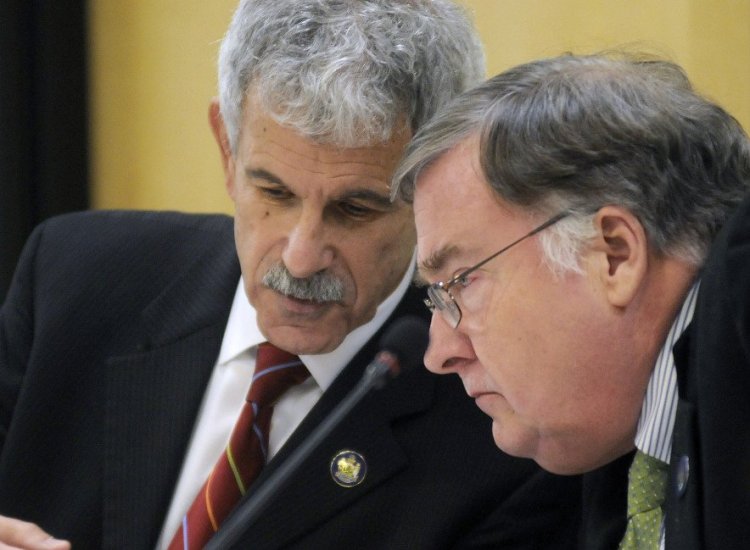AUGUSTA — A legislative committee set the stage for possible impeachment proceedings by voting Thursday to accept a report that found Gov. Paul LePage’s threat to withhold state funding for a private school prompted it to rescind a job offer to House Speaker Mark Eves.
More likely, however, is that the fact-finding report will provide valuable evidence for Eves’ civil lawsuit against the governor.
Those prospects hovered in the background as the Government Oversight Committee voted 7-5, after a lengthy and often heated debate, to accept the 25-page report by the Office of Program Evaluation and Government Accountability. Republicans on the panel didn’t dispute OPEGA’s finding that the governor’s threat to withhold $530,000 from Good Will-Hinckley forced the nonprofit to rescind its offer to make Eves its next president.
Instead, Republicans focused on LePage’s stated motive: that Eves was unqualified for the job.
Several lawmakers worried that the governor’s actions will set a disturbing precedent, while others believed that Eves’ hiring by the Fairfield school was politically motivated and unfair.
Five Republicans were willing to accept the majority of the OPEGA report, but they rejected the portion that asserted Good Will-Hinckley followed a rigorous and fair hiring process.
Those arguments are expected to be the focus of the civil lawsuit against LePage that Eves filed in July. Eves has argued that the governor blackmailed Good Will-Hinckley and violated his First Amendment rights.
His attorney, David Webbert, released a statement Thursday saying that the OPEGA inquiry “will provide a strong foundation for Maine’s federal court and a Maine jury to determine whether Governor LePage broke the law and should be held personally accountable.”
Meanwhile, some Democratic lawmakers said Thursday that the oversight committee’s endorsement of the OPEGA report should not end the controversy. Rep. Ben Chipman, D-Portland, one of several legislators who requested the investigation, said he and other lawmakers plan to reprimand the governor. He said they have asked the Office of Attorney General to appoint a special prosecutor to determine if LePage violated state law. They also have contacted Kennebec County District Attorney Maeghan Maloney.
Chipman said the lawmakers don’t know yet whether either office will agree to their request. If they don’t, he said the lawmakers will ask the Democrat-controlled House of Representatives to initiate impeachment proceedings or a censure.
“We’re pursuing several options that include, but are not limited to, impeachment,” Chipman said. “There are several actions that can be taken in the House that can hold the governor accountable for his behavior. We feel an obligation to do that.”
Democratic legislative leaders also vowed to explore reprimand options, but stopped short of calling for impeachment.
“It’s clear that we have to do everything in our power to prevent this governor or any future one from abusing their power to punish people they disagree with,” said Senate Democratic leader Justin Alfond of Portland.
The launching of an impeachment proceeding requires only a majority vote in the House, which has “sole power of impeachment” under the state Constitution and is currently controlled by Democrats. The Senate would then act as judge and jury, and removal from office or other serious penalties would require a two-thirds vote by that chamber.
The likelihood that the Legislature would oust LePage is remote given that Republicans control the Senate.
Nationally, there have been 17 impeachment proceedings against governors and eight convictions, according to the Council of State Governments. No Maine governor has ever been impeached.
PROPER USE – OR ABUSE – OF POWER?
OPEGA investigators found that the LePage administration moved to withhold funding from Good Will-Hinckley after the governor expressed opposition to the hiring of Eves. The report laid out a timeline that shows when the administration began voicing its displeasure over the school’s plans, but makes no determination of wrongdoing.
Investigators found that Tom Desjardin, the acting education commissioner, ordered finance staff to withhold the first quarterly payment to Good Will-Hinckley after meetings in which LePage told his senior staff that he no longer could support the school.
The oversight panel later received sworn testimony from officials with Good Will-Hinckley, the LePage administration and the Harold Alfond Foundation that largely corroborated the OPEGA report. LePage officials, however, denied that they explicitly made a threat to Good Will-Hinckley’s representatives about withholding funding – even though the governor acknowledged doing so in a June interview with reporters.
Many lawmakers found the report’s findings troubling and believed the governor had overstepped his authority.
“It concerns me greatly that we have an abuse of power that the governor threatened Good Will-Hinckley with funding and admitted as much,” said Sen. Chris Johnson, D-Somerville.
Rep. Anne-Marie Mastraccio, D-Sanford, said the governor’s actions were unethical and set a poor example.
“For me this is about modeling behavior,” she said. “The most powerful person in our state is showing us that this is how you get things done. What was done was wrong.”
Sen. Roger Katz, R-Augusta, co-chairman of the oversight committee, acknowledged that the OPEGA report will lead some to determine that the Republican governor acted appropriately when he made the funding threat. But Katz did not agree that LePage’s actions were justified.
Katz, the only Republican to accept the report in its entirety, worried that the governor’s actions will set a new precedent. He said Good Will-Hinckley has a “right to make their own hiring decisions without interference from anyone.”
“Are we entering an era when politicians will have veto power over private hiring decisions?” asked Katz. That could cause lawmakers and other private entities to fear retribution for their votes or actions, he said.
Other Republicans on the committee zeroed in on the governor’s assertion that Eves wasn’t qualified for the Good Will-Hinckley job.
Rep. Deborah Sanderson, R-Chelsea, lamented the committee’s decision not to examine the school’s hiring process. “This was not a fair (hiring process),” she said.
Sen. David Burns, R-Whiting, said the committee’s review was unfair because it didn’t explore that issue. Burns also said the governor was open about his displeasure over the hiring of Eves.
“I do know there is such a thing as executive privilege,” he said. “I do know we want our executive to exercise that.”
OPEGA Director Beth Ashcroft defended her agency’s determination that the hiring process was fair and thorough.
“It wasn’t like he (Eves) applied and he was hired,” Ashcroft said. The school has said Eves was the best candidate identified in a nine-month search.
Republican criticism was spurred by Nov. 12 testimony from Bill Brown, an Eves aide who also is chairman of the Maine Academy of Natural Sciences, a charter school operated by Good Will-Hinckley. Republicans on the committee wanted to delve deeper into Eves’ qualifications, but Katz and Democrats stopped the Republican-led line of questioning, arguing that the topic was beyond the scope of the investigation.
The OPEGA report found LePage was convinced that Eves’ hiring was cronyism when he learned of Brown’s involvement with the school.
During the school’s hiring process, Brown recused himself from any discussion about Eves, but he did discuss other candidates and provided Eves with advice. Brown acknowledged that he should have removed himself entirely from the process.
LEPAGE SPOKESWOMAN: TIME TO MOVE ON
After Thursday’s meeting, Sanderson asserted that Eves had voted against charter schools and that the governor was justifiably concerned with the hiring. She was then asked why Good Will-Hinckley would hire Eves if officials thought he would do the organization harm. Sanderson didn’t directly answer, but said there were legitimate questions about the hiring process that the oversight committee did not explore.
“The rules were changed in the game,” Sanderson said, adding, “I wish I would have been able to pursue that line of questioning, but there were others on the committee who were solely focused on the governor, what the governor did, what they feel the governor did wrong.”
Johnson said the focus on the hiring process was a distraction from the governor’s actions.
“This is not a fiefdom. This is representative government,” he said.
Adrienne Bennett, the governor’s spokeswoman, said the OPEGA review “was little more than a political witch hunt triggered by overreaching politicians who have a history of leading attacks on the governor.”
She added, “As the governor has said all along, there’s nothing there. Even committee Chair Katz admitted there was no crime committed by anyone. It’s time to move on from this kind of political chicanery and get to work for the people of Maine.”
The oversight committee will vote on additional findings gathered in sworn testimony and documents at a later date.
Send questions/comments to the editors.




Comments are no longer available on this story